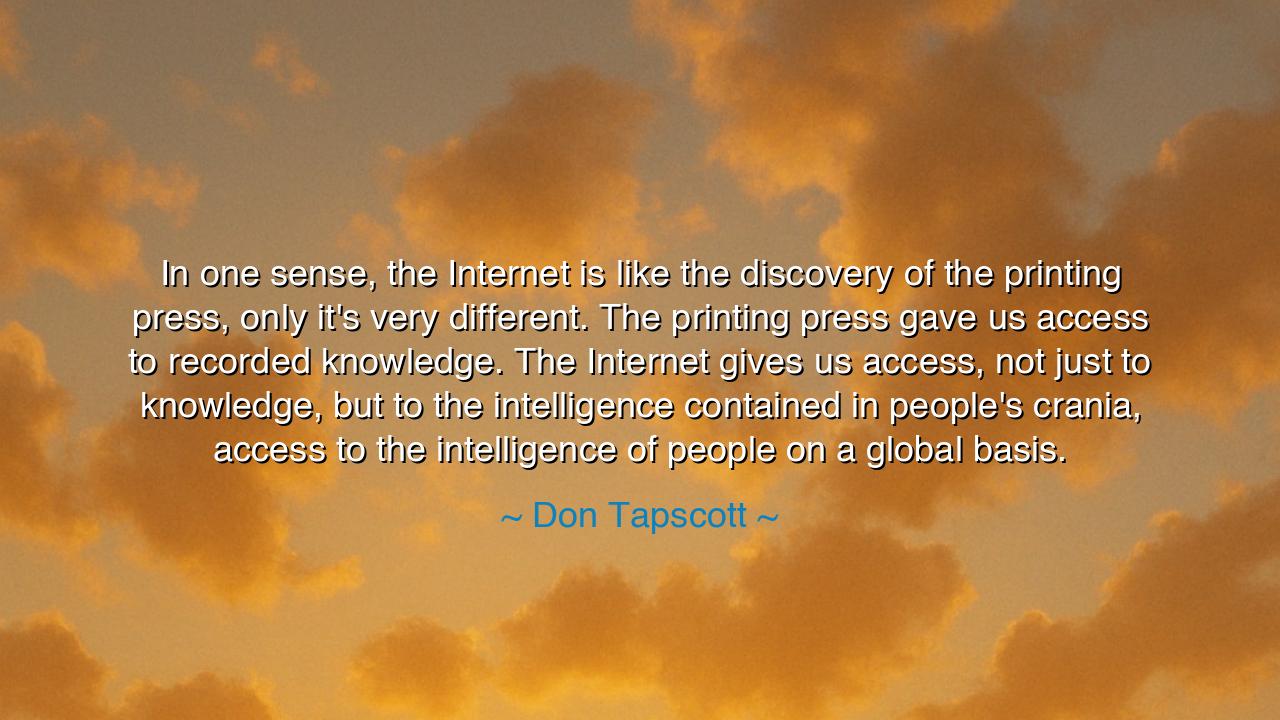
In one sense, the Internet is like the discovery of the printing
In one sense, the Internet is like the discovery of the printing press, only it's very different. The printing press gave us access to recorded knowledge. The Internet gives us access, not just to knowledge, but to the intelligence contained in people's crania, access to the intelligence of people on a global basis.






When Don Tapscott, the scholar of the digital age, spoke the words, “In one sense, the Internet is like the discovery of the printing press, only it's very different. The printing press gave us access to recorded knowledge. The Internet gives us access, not just to knowledge, but to the intelligence contained in people's crania—access to the intelligence of people on a global basis,” he was not merely describing a technological revolution. He was describing a transformation of consciousness, a new chapter in the evolution of the human mind. His words ring with the same wonder that must have filled the hearts of those who first held a printed book—the realization that the boundaries of human thought had been forever expanded.
To the ancients, such a moment would have been considered divine—an awakening of humanity’s collective intelligence. The invention of the printing press, born in the fifteenth century through the genius of Johannes Gutenberg, shattered the barriers of ignorance. It took knowledge from the guarded libraries of the powerful and scattered it like seed across the fields of civilization. The written word multiplied, and with it came the Reformation, the Renaissance, and the dawn of modern thought. Tapscott, standing centuries later, saw in the Internet the echo of that same miracle—but magnified beyond imagining. The printing press set thought free upon the page; the Internet set thought itself free, linking mind to mind, across oceans, borders, and time.
What Tapscott means when he speaks of “the intelligence contained in people’s crania” is that for the first time in human history, we are not merely consuming the wisdom of the past—we are communing with the living mind of the present. The Internet is not a library of static words; it is a conversation of billions, a river of consciousness in which every human soul can pour a drop of its insight. Unlike the written page, which speaks in silence, the Internet listens and responds. It is, in a sense, the awakening of a global brain, a network where humanity can think together, create together, and—if guided by wisdom—grow together.
But as with all gifts of Prometheus, this fire is both sacred and dangerous. The printing press, though it illuminated the world, also unleashed confusion and conflict, for not all who read sought truth. So too the Internet, though it gives us access to the intelligence of the world, also opens the door to folly, deceit, and division. Tapscott’s words carry both celebration and warning: we now stand in the presence of the most powerful tool for human connection ever created—but what we do with it will define whether it becomes a ladder to enlightenment or a mirror of chaos. The Internet is not merely a machine; it is a reflection of ourselves.
Consider the story of the Arab Spring in 2011. Through the Internet, ordinary citizens, long silenced, found a collective voice. They shared truth, courage, and vision faster than any regime could contain. For a time, the digital realm became the heartbeat of freedom. Yet the same networks that once empowered liberation have since been used to spread misinformation, fear, and division. Thus, the Internet—like the printing press before it—remains a double-edged sword: the power to unite or divide, to illuminate or deceive. Its value depends not on the network itself, but on the intent of those who use it.
In this light, Tapscott’s quote becomes more than observation—it becomes prophecy. He reminds us that humanity is now a single, interconnected organism. Our thoughts, once solitary, now ripple through the global web like sparks through a vast neural network. This is both a wonder and a burden. The intelligence of the world is at our fingertips, but so too is the temptation to remain shallow, to consume without reflecting, to connect without understanding. Wisdom in the digital age requires discernment: the courage to seek truth amid noise, and to use connection not for vanity, but for creation and compassion.
So let this be the lesson: the Internet is not an oracle—it is a mirror. What it reflects depends upon the hearts of those who use it. Use it to share truth, and it becomes a library of light. Use it to deceive, and it becomes a web of shadow. Each message sent, each word written, each idea shared is a strand in the great tapestry of collective thought. Therefore, let your contribution be one of clarity, kindness, and courage. Remember that your voice joins the chorus of the human mind—and that chorus can sing either harmony or discord.
In the end, Don Tapscott’s insight is both celebration and calling. The printing press freed the written word; the Internet has freed the human mind. But freedom, without wisdom, leads only to noise. Therefore, let us be not merely connected, but conscious. Let us use this gift not to scatter our thoughts into chaos, but to weave them into understanding. For if we learn to think together as one, then truly, for the first time in history, the world will have found not just knowledge—but shared intelligence, the mind of humankind awake within itself.






AAdministratorAdministrator
Welcome, honored guests. Please leave a comment, we will respond soon